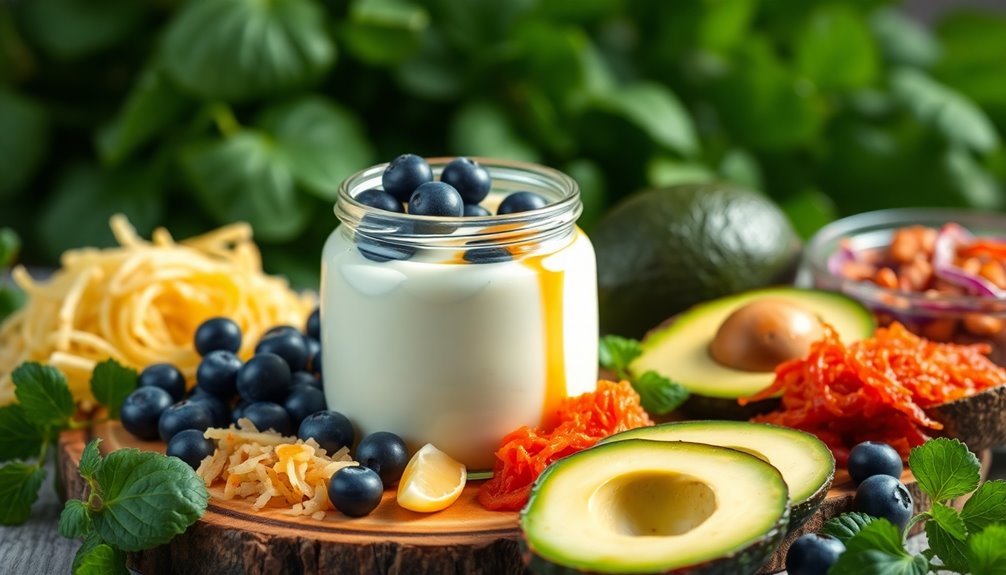Incorporating probiotic-rich foods into your diet can greatly enhance your immune system and help fight illness. Yogurt and kefir are excellent sources, offering beneficial bacteria that improve gut health. Fermented vegetables like kimchi and sauerkraut also play an essential role, promoting digestion and nutrient absorption. Kombucha provides antioxidants and supports gut function, while miso and tempeh are excellent for plant-based diets. Snacking on probiotic popcorn or yogurt granola can further bolster your digestive health. By adding these foods to your meals, you're taking a proactive step toward overall wellness—discover more about how they can impact your health positively.
Key Takeaways
- Probiotic-rich foods like yogurt and kefir support gut health, enhancing the immune system's ability to fight illness.
- Fermented vegetables such as kimchi and sauerkraut provide beneficial bacteria that promote digestive health and immune function.
- Kombucha offers antioxidants that can help reduce inflammation and strengthen the immune response against illnesses.
- Miso and tempeh are rich in nutrients and probiotics, supporting overall health and resilience against infections.
- Incorporating these foods into your diet can help maintain gut health, which is crucial for a strong immune system.
What Are Probiotics?
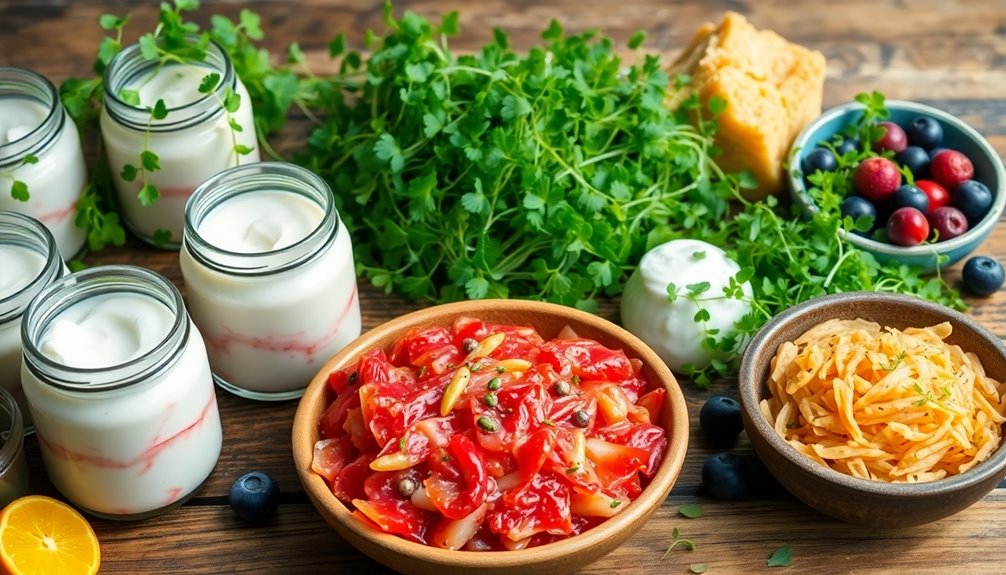
Probiotics are live microorganisms that can provide health benefits when consumed in adequate amounts. You might've heard about these friendly bacteria and their role in supporting gut health. When you incorporate probiotics into your diet, you're not just adding good bacteria; you're also helping to create a balanced gut microbiome.
This balance is essential for digestion, nutrient absorption, and overall well-being.
Research shows that probiotics can improve gut health by preventing harmful bacteria from taking over. They also help break down food, making it easier for your body to absorb essential nutrients. If you struggle with digestive issues like bloating or irregular bowel movements, probiotics may offer relief by promoting a healthier gut environment.
Moreover, the health benefits of probiotics extend beyond digestion. They're linked to improved immune function, reducing the risk of infections, and even enhancing mood and mental health. You might feel more energized and less stressed when your gut is functioning optimally.
Incorporating probiotics into your daily routine can be simple. You can try yogurts, kefir, sauerkraut, or kombucha, all rich in these beneficial microorganisms. Being part of a community that values gut health can also inspire you to make healthier choices.
Benefits of Probiotic Foods

Incorporating probiotic-rich foods into your diet can offer a multitude of health benefits that go beyond just gut health. When you consume these foods, you're not only promoting a balanced gut microbiome but also enhancing your overall well-being. Research shows that a diverse gut flora can lead to improved digestion, reduced bloating, and even better nutrient absorption. But that's not all; probiotics can also play an essential role in supporting your immune system.
Here's a quick look at some key benefits of probiotic foods:
| Benefit | Description | Evidence |
|---|---|---|
| Enhanced Gut Health | Aids in digestion and reduces gastrointestinal issues | Studies show improved gut flora balance |
| Strengthened Immune System | Boosts immune response and reduces infections | Research indicates lower incidence of colds |
| Mental Health Improvement | Positively impacts mood and mental clarity | Links found between gut health and mental well-being |
| Anti-Inflammatory Effects | Helps reduce inflammation throughout the body | Evidence supports reduced inflammatory markers |
| Nutrient Absorption | Increases absorption of vitamins and minerals | Better gut health leads to enhanced nutrient uptake |
Additionally, studies indicate that plant-based diets rich in probiotics can further enhance your gut health and overall wellness.
Yogurt: A Dairy Delight
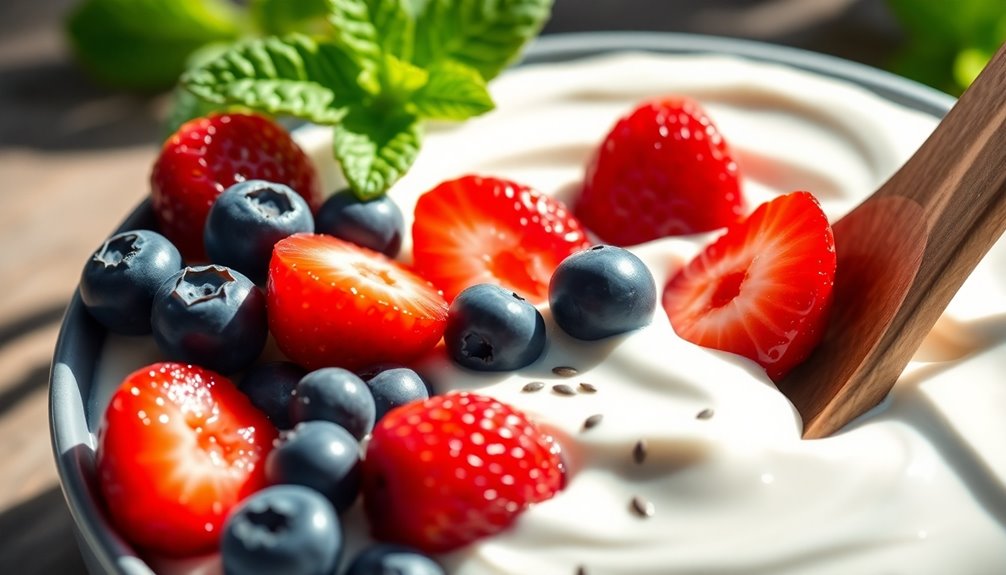
Creamy and versatile, yogurt stands out as one of the most popular probiotic-rich foods available today. It's not just delicious; it's also packed with live cultures that can support your gut health and boost your immune system. When you choose yogurt, you're not just indulging in a tasty snack; you're actively contributing to your well-being.
You might be wondering about yogurt alternatives, especially if you're lactose intolerant or prefer plant-based options. Fortunately, there's a wide variety of non-dairy yogurts made from almond, coconut, or soy. These alternatives often contain similar probiotic benefits, making it easier for everyone to enjoy the perks of probiotics.
Incorporating yogurt into your diet can be as simple as adding it to smoothies, using it as a base for salad dressings, or enjoying it with fresh fruits. Additionally, consuming probiotic-rich foods like yogurt can complement practices that promote healthy nerves and overall wellness.
Not a fan of yogurt? You can consider probiotic supplements as another way to get those beneficial bacteria. While supplements can be effective, yogurt offers the added advantage of being a whole food, complete with essential nutrients.
When you choose yogurt or its alternatives, you're not just making a dietary choice; you're joining a community that values health and wellness. So, whether you're enjoying a classic dairy yogurt or trying out a new plant-based variety, you're taking a step towards a healthier you. Embrace this dairy delight and savor the benefits it brings!
Kefir: A Nutrient Powerhouse
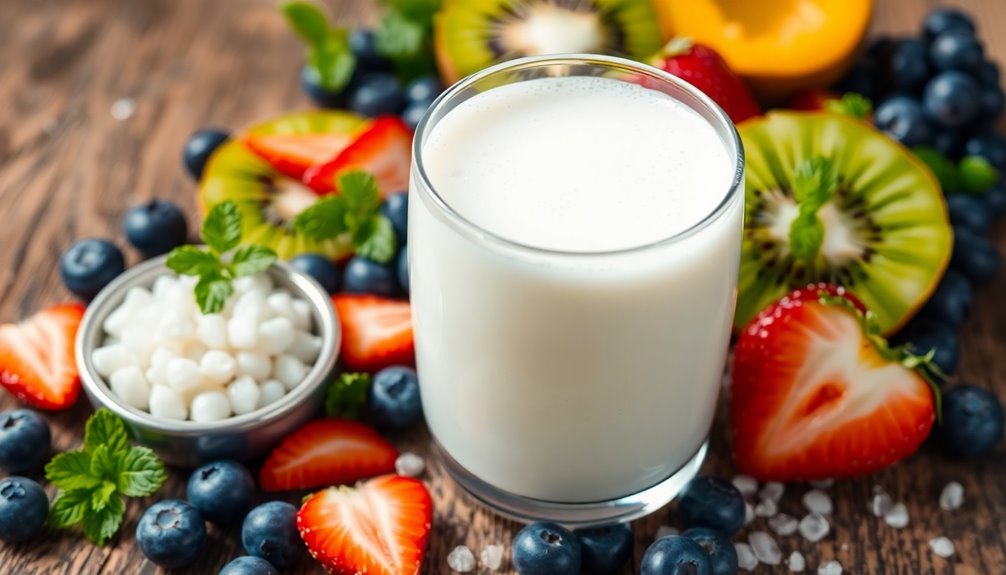
Kefir packs a powerful punch when it comes to nutrition and probiotic content. This fermented dairy product is loaded with beneficial bacteria, making it an excellent choice for enhancing gut health. Just one cup of kefir can contain billions of probiotics, which help maintain a balanced microbiome, a key factor in overall wellness.
You might be surprised to learn that kefir's health benefits extend beyond gut health. Studies indicate that regular consumption can improve digestion, boost your immune system, and even support mental health. The diverse strains of probiotics found in kefir can help reduce inflammation and may even assist in managing conditions like irritable bowel syndrome (IBS).
One of the easiest ways to enjoy kefir is through kefir smoothies. These nutrient-packed drinks blend the creamy texture of kefir with fruits, nuts, or greens, providing a delicious and convenient way to incorporate this powerhouse into your diet.
You can mix it up by adding ingredients like spinach, banana, or even a scoop of protein powder for an extra health boost. Additionally, a plant-based diet can enhance your overall health and well-being, complementing the benefits of kefir.
Incorporating kefir into your daily routine not only enhances your nutritional intake but also fosters a sense of community. Sharing kefir recipes or smoothie creations with friends and family can inspire others to explore the health benefits of this amazing food. So why not grab a bottle of kefir today and start experiencing all the goodness it has to offer?
Fermented Vegetables

Fermented vegetables are a vibrant and flavorful way to boost your diet with probiotics. When you incorporate options like homemade kimchi and various sauerkraut variations into your meals, you're not just enhancing taste; you're also promoting gut health. These foods are rich in beneficial bacteria that can improve digestion and strengthen your immune system.
Homemade kimchi, made from napa cabbage and seasoned with garlic, ginger, and chili, offers a spicy kick alongside its probiotic benefits. You can easily customize it to suit your taste, adding ingredients like radishes or carrots to enrich the nutrient profile. The fermentation process encourages the growth of good bacteria, which can aid in balancing your gut flora.
On the other hand, sauerkraut variations provide a milder taste that's equally nutritious. Traditional sauerkraut, crafted from finely shredded cabbage and salt, can be a delightful addition to sandwiches or salads. Experimenting with different vegetables like beets or carrots allows you to explore unique flavors and textures while reaping the health benefits.
Incorporating fermented vegetables into your daily diet not only fosters a sense of culinary adventure but also helps you connect with others who share a passion for healthful eating. Moreover, homemade vegan smoothies are another excellent way to increase your protein intake while enjoying delicious flavors. Embrace the process of making these foods at home, and you'll find that it's both rewarding and beneficial for your well-being. So why not take the plunge and start enjoying the many advantages of fermented vegetables today?
Kombucha: The Gut Elixir

Kombucha, often hailed as a gut elixir, is a fizzy drink that not only tantalizes your taste buds but also supports digestive health. This fermented beverage is made through a process called kombucha brewing, where sweetened tea is combined with a symbiotic culture of bacteria and yeast (SCOBY).
As the fermentation occurs, beneficial probiotics are produced, providing numerous gut health benefits.
Many people turn to kombucha to enhance their digestive wellness. The live cultures present in kombucha can help balance your gut microbiome, which is essential for best digestion and nutrient absorption. Research suggests that these probiotics can aid in alleviating digestive issues like bloating and constipation, making kombucha a popular choice for those seeking relief.
Moreover, kombucha is rich in antioxidants, which help combat oxidative stress and inflammation in your body. This can bolster your immune system, allowing you to fend off illnesses more effectively. You might also find that the fizzy, tangy flavor of kombucha offers an invigorating alternative to sugary sodas and juices, making it easier to integrate into your daily routine. Additionally, incorporating custom keto diet plans can further enhance your digestive health and overall wellness.
Whether you're exploring kombucha brewing at home or purchasing it from a store, it's a delightful way to support your gut health. So, why not join the growing community of kombucha enthusiasts? Embrace this bubbly drink and enjoy the gut health benefits it can bring to your life.
Miso and Tempeh

Miso and tempeh are powerhouse foods that offer a wealth of probiotic benefits for your gut health. Both are fermented products, making them rich in beneficial bacteria that can enhance digestion and support your immune system. When you incorporate these foods into your diet, you're not just adding flavor; you're promoting a thriving gut microbiome.
The health benefits of miso and tempeh extend beyond gut health. Miso, a fermented soybean paste, is packed with essential nutrients like vitamins B, E, and K, as well as antioxidants. It can help lower blood pressure and may even have anti-cancer properties.
Tempeh, on the other hand, is a fermented soy cake that's high in protein and fiber. It's a fantastic meat substitute, making it an excellent choice for plant-based diets. Plus, it's rich in minerals like calcium and iron.
In terms of culinary uses, both miso and tempeh are incredibly versatile. You can use miso to create flavorful soups, dressings, or marinades, adding depth and umami to your dishes.
Tempeh can be sautéed, grilled, or crumbled into stir-fries, tacos, or salads, providing a hearty texture and nutty flavor. Additionally, incorporating fermented foods like miso and tempeh can help boost energy levels, supporting an overall healthier lifestyle.
Probiotic-Rich Snacks
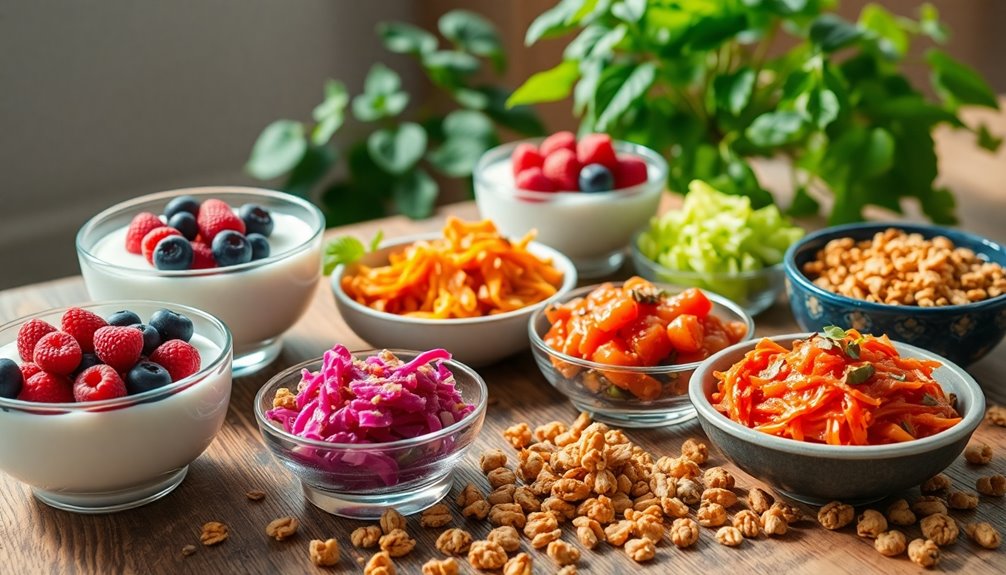
Probiotic-Rich Snacks
Snacking can be a great opportunity to enhance your gut health with probiotic-rich options. When you select snacks that incorporate probiotics, you help support your digestive system and overall wellness. Here are a couple of delightful options to contemplate:
| Probiotic Snacks | Benefits |
|---|---|
| Probiotic Popcorn | This unique twist on a classic snack is made with probiotic-infused seasonings. It's light, crunchy, and perfect for movie nights or afternoon cravings. Plus, popcorn itself is a whole grain, making it a fiber-rich option for your gut! |
| Gut Friendly Granola | Look for granola that contains yogurt or kefir cultures. Not only does it satisfy your hunger, but it also provides the benefits of probiotics alongside healthy oats and nuts. Enjoy it with yogurt for an extra gut-boosting treat. |
Incorporating these snacks into your routine can be simple and enjoyable. Whether you're munching on probiotic popcorn while watching your favorite show or savoring gut-friendly granola as a breakfast option, you're making positive choices for your health. Remember, every small step counts when it comes to nurturing your gut. By choosing snacks that are both delicious and probiotic-rich, you'll be well on your way to feeling your best while sharing tasty experiences with friends and family! Additionally, understanding natural calorie cycles can further support your overall health while enjoying these snacks.
Tips for Incorporating Probiotics

Incorporating probiotics into your diet can be a simple and rewarding endeavor. By making small adjustments to your daily meals and snacks, you can enhance your gut health and overall well-being. Here are some tips to help you seamlessly include probiotics in your routine:
- Choose Probiotic-Rich Foods: Start by adding fermented foods like yogurt, kefir, sauerkraut, and kimchi to your meals. These foods aren't only delicious but also packed with beneficial bacteria. If you're not a fan of these flavors, consider exploring other options to suit your taste preferences.
- Opt for Probiotic Drinks: If you prefer beverages, look for probiotic drinks like kombucha or probiotic smoothies. They're flavorful and can be a fun way to boost your probiotic intake. Just be mindful of sugar content in some drinks, which can offset the health benefits.
- Consider Probiotic Supplements: If you find it challenging to get enough probiotics through food alone, supplements can be a practical choice. However, it's crucial to consult with a healthcare provider to avoid potential health risks associated with overconsumption or incompatible strains. Additionally, maintaining a balanced diet can further enhance the effectiveness of a comprehensive program designed for overall health benefits.
Frequently Asked Questions
Can Probiotics Help With Specific Illnesses Like IBS or Allergies?
Yes, probiotics can help with specific illnesses like IBS and allergies. For IBS relief, many find that probiotics improve gut health and reduce symptoms. Incorporating a probiotic-rich diet for allergies may also boost your immune response, potentially easing allergic reactions.
It's important to choose the right strains, as not all probiotics are effective for every condition. Always consult a healthcare professional to tailor a plan that suits your needs.
Are There Any Side Effects From Consuming Too Many Probiotics?
If you consume too many probiotics, you might experience some side effects. Probiotic overdose risks include digestive issues like bloating and gas, as your body struggles to maintain a healthy probiotic balance. You don't need to worry too much, but paying attention to your body is crucial. Moderation is key to avoiding balance concerns, ensuring you reap the benefits without the discomfort. Always consult a healthcare professional if you're uncertain about your intake.
How Long Does It Take for Probiotics to Show Effects?
Did you know that around 70% of your immune system resides in your gut?
When you start taking probiotics, the timeline for effects can vary. Generally, if you're consistent with a daily intake of an appropriate dosage, you might notice changes within one to four weeks.
Different probiotic strains can yield different results, so selecting the correct one for your needs is crucial.
Stay patient; the benefits will come!
Can I Get Enough Probiotics Without Supplements?
Yes, you can get enough probiotics without supplements! By incorporating natural sources like yogurt, kefir, sauerkraut, and kimchi into your diet, you'll enjoy probiotic diversity that supports gut health. These foods not only add flavor but also foster a sense of community as you explore various recipes.
Aim for a mix of fermented foods to guarantee you're getting a range of beneficial bacteria, helping you feel connected to your health journey.
Are There Vegan Sources of Probiotics Available?
Yes, there are plenty of vegan probiotic options available! You can enjoy probiotic-rich plant foods like sauerkraut, kimchi, and miso, which provide beneficial bacteria. Other great choices include tempeh and fermented beverages like kombucha. Incorporating these foods into your diet not only boosts your gut health but also aligns with a compassionate lifestyle. So, experiment with these delicious options and feel the positive impact on your overall well-being!
Conclusion
Incorporating probiotic-rich foods into your diet could be your secret weapon against illness. Imagine boosting your gut health with delicious options like yogurt, kefir, and kombucha. As you explore these nutrient-packed delights, you'll not only support your immune system but also enhance your overall well-being. So, what are you waiting for? Immerse yourself in the world of probiotics, and discover the powerful benefits that await you—your gut will thank you!

